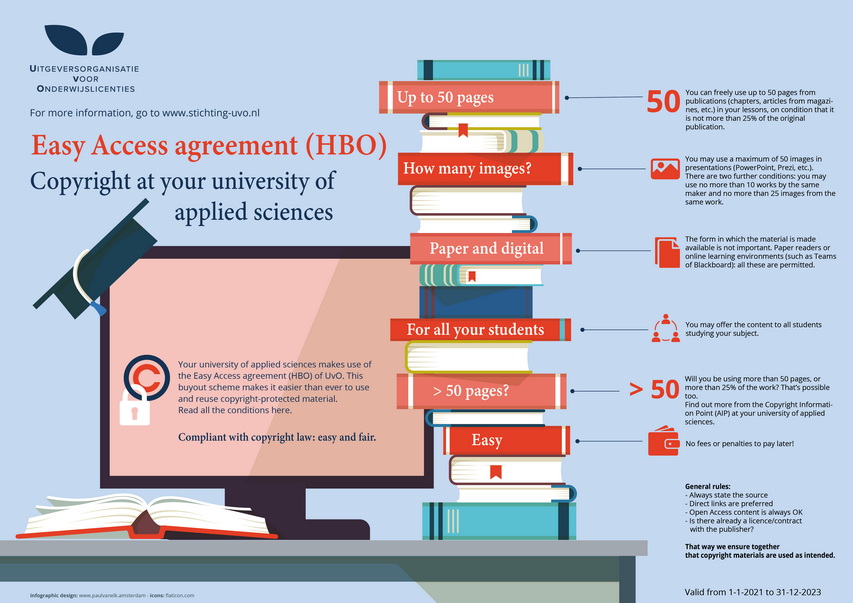The Easy Access Agreement
for Higher EducationWhenever you use someone else's content, you have to consider copyright. Normally, you would always have to ask permission from the author for using any text or image. Fortunately, the Easy Access Agreement exists. This makes the use of copyrighted material within higher education a lot easier!
In brief
Rules on reuse of copyrighted material in education1. Short quotations
From books and journals, you may copy up to 50 pages, but no more than 25% of the whole work. In journals, an issue is seen as the whole work. Print or digital makes no difference. Please note that the use of up to 50 pages from the same source applies per institute. If more is (knowingly) shared from the same source within the institute, this is considered a longer quotation.
In a presentation (PowerPoint, Sway, Prezi, etc.), you may use a maximum of 50 images (or graphs, tables, diagrams): with a maximum of 10 works from the same creator and no more than 25 images from the same source.
2. Longer quotations
Do you want to share more than 50 pages, or more than 25% of a work? Then this falls outside the regulation and you must request permission from the rights holder.
Read how this works
3. Referencing
For both short and longer quotations, citing sources is mandatory. If you share text or images from a source in the LMS or a reader, make sure that the source is clearly stated. Using a reference style such as APA is preferred, but not compulsory. For books, cite at least title, author and publisher. In case of a newspaper or magazine, state the year and issue number. For digital sources also mention the URL.
Sources in presentations
Crediting sources in presentations (PowerPoint, Prezi) on the electronic learning environment is mandatory. Mention the source of shared images. This can be directly with the image, or bundled on a separate slide. Give at least the name of the creator, title and publisher. In the case of digital sources, also state the URL.
- Book: Author, Title, Year, Publisher.
Saunders, M. N. K., Lewis, P., & Thornhill, A., 2019. Research methods for business students. Pearson. - Article: Author, Title, Year, Publisher. Volume, Issue number. (Online article also URL).
Kristof, C., Data and copyright. Bulletin of the Association for Information Science and Technology, 2016, Volume 42, Issue 6. https://doi.org/10.1002/bul2.2016.1720420607 - Website: Author, Title, Year, Publisher, URL.
Access2Markets, Everything but Arms (EBA), European Commission. https://trade.ec.europa.eu/access-to-markets/en/content/everything-arms-eba - Image: Cite the source the image derives from, e.g. a book or article.
- Image from website: Maker, Publisher, URL.
Marit Breuker, Profielen, https://profielen.hr.nl/2023/inclusief-zijn-in-de-klas-hoe-ver-ga-je-als-docent/ - Source with license for reuse (e.g. Creative Commons license):
Author, Year, License, URL.
Proctor Academy, 2012. CC BY-NC-SA 2.0. https://www.flickr.com/photos/proctoracademy/8254461709/
And also...
- Using Open Access material is always good.
- Linking is preferable.


